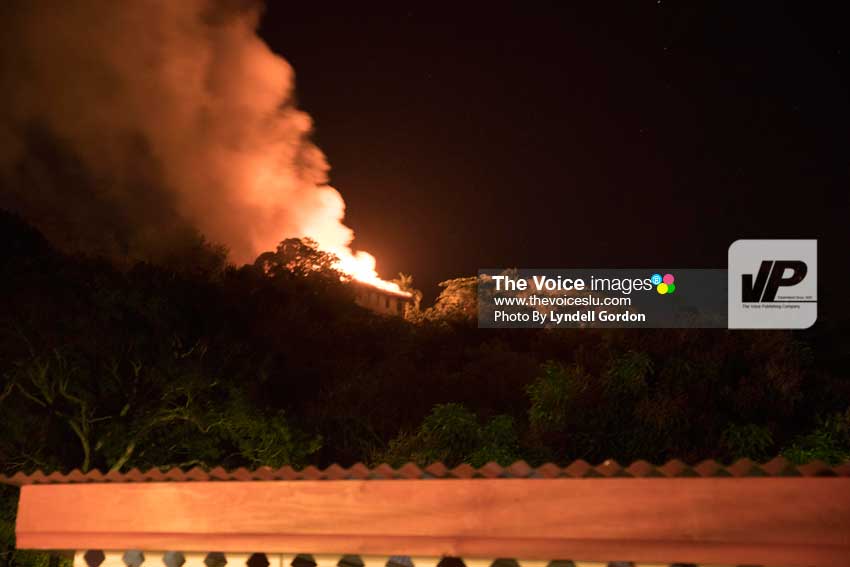THE need for digitisation became the main topic of discussion, as the documents, audio and video recordings of St. Lucian history, only found at the Folk Research Centre (FRC) were lost in the Sunday night fire, which also consumed the Mt. Plaisance building.
Many persons, including those on local phone-ins and talk radio, have expressed profound bewilderment as to how in the year 2018, those documents, audio and video recordings were not yet digitized — meaning that they were lost forever once the physical copies were destroyed by the fire.

In the age where everything (including currency) has gone digital, it would have been a rather simple matter, to not only save those valuable documents and recordings on a hard drive (which could also be destroyed by fire) but also within the (internet) cloud, where it could have been accessible to anyone with a One Drive, Amazon Drive or any other cloud service account and password.
The information would then have been accessible on any device, making their destruction in the fire null.
Alas, that was not the case, as pointed out by Founding Director of FRC Patrick Anthony, who although in positive spirits at the Monday press confrence, could not help but acknowledge how crucial it would have been to have the content of FRC digitised before the fire took place.
It was “a very painful one for me” Anthony stated. “Since (the year) 2003…we have been presenting internationally, proposals to digitize everything we have”, which would have preserved the exclusive content lost in the fire.
He also said: “We (went) to all kinds of international agencies to say look, we want to preserve our stuff in case something happens. Nobody has come forward. Everybody has a different priority: “Well that eh too important.”
Anthony insisted that the FRC has always known about the importance and necessity of digitising the content of the Centre but that the assistance was not forthcoming.
“We always knew the importance” he said. “Now we can feel the loss.”
He was, however, hopeful, that the lessons of the permanent losses the FRC and indeed St. Lucia have suffered may be learnt in time to spare similar institutions such as the National Archives from a similar fate.
“We hope that this is going to be a wake-up call for persons responsible for the memory of a nation for example our National Archives.”
He also reemphasized the importance of digitisation, asking rhetorically what if the National Archives had suffered the same fate.
“If it were the archives of St. Lucia that were burnt down today, what would you do? Do we have backup copies? So digitization is a priority, it’s not a luxury, it’s a priority.”
Anthony also spoke about other agencies the FRC has been “partnering with” in order to prevent the information from being stored exclusively with the FRC.
He said that “because of our partnership with international institutions, certain projects that were done with us were saved.”
He went on to give two examples. The first as he said, was with “the University of Vienna (that) had done a research project with FRC, and they have their copies of all the documentation that was done. They gave us copies for ourselves, these are lost, but fortunately they have their copies.”
The second was with “the University of Indiana,” that has saved material from the work they did with the FRC. Thanks to that “we’ll be able to access the material from them…” Anthony said.
Despite that tiny spate of good news, the FRC’s Founding Director did concede that “the bulk of our stuff was there (at FRC).”
He did want to stress that it was not for want of trying on FRC’s part, that digitisation of its content (most especially its exclusive content) was not digitised, saying, “We have been writing to all kinds of agencies, talking to all kinds of people saying, we need to digitize, we need to digitize, we will lose it, we will lose it.
“It’s not for lack of knowledge or concern or interest. We’ve had a passion for that.”







![Attendees at the UHC logo and website launch [Photo credit: GOSL]](https://thevoiceslu.com/wp-content/uploads/2026/02/Attendees-at-the-UHC-logo-and-website-launch-380x250.jpg)






![Remnants of an alleged drug boat blown up in a lethal strike by the U.S. military last week surfaced off Canouan on Saturday [Photo credit : St Vincent Times]](https://thevoiceslu.com/wp-content/uploads/2026/02/Remnants-of-an-alleged-drug-boat-blown-up-380x250.jpg)
